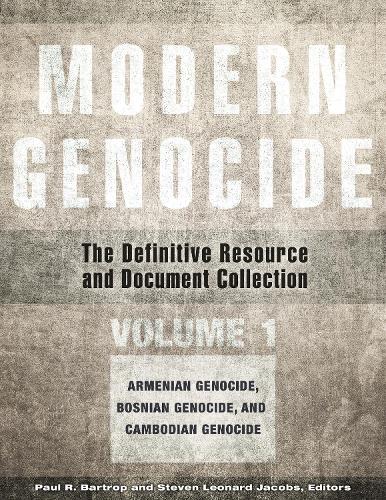
Modern Genocide: The Definitive Resource and Document Collection [4 volumes]
Available Formats
Publishing Details
Modern Genocide: The Definitive Resource and Document Collection [4 volumes]
By (Author) Professor Paul R. Bartrop
Edited by Steven Leonard Jacobs
Bloomsbury Publishing PLC
ABC-CLIO
17th December 2014
United States
Classifications
Tertiary Education
Non Fiction
General and world history
364.15109
Winner of 2015 Outstanding Academic Title 2016
Physical Properties
Contains 4 hardbacks
7258g
Description
This massive, four-volume work provides students with a close examination of 10 modern genocides enhanced by documents and introductions that provide additional historical and contemporary context for learning about and understanding these tragic events. Modern Genocide: The Definitive Resource and Document Collection spans nearly 1,700 pages presented in four volumes and includes more than 120 primary source documents, making it ideal for high school and beginning college students studying modern genocide as part of a larger world history curriculum. The coverage for each modern genocide, from Herero to Darfur, begins with an introductory essay that helps students conceptualize the conflict within an international context and enables them to better understand the complex role genocide has played in the modern world. There are hundreds of entries on atrocities, organizations, individuals, and other aspects of genocide, each written to serve as a springboard to meaningful discussion and further research. The coverage of each genocide includes an introductory overview, an explanation of the causes, consequences, perpetrators, victims, and bystanders; the international reaction; a timeline of events; an Analyze section that poses tough questions for readers to consider and provides scholarly, pro-and-con responses to these historical conundrums; and reference entries. This integrated examination of genocides occurring in the modern era not only presents an unprecedented research tool on the subject but also challenges the readers to go back and examine other events historically and, consequently, consider important questions about human society in the present and the future.
Reviews
This work lends itself to disciplinary approaches in law, history, human rights, social psychology, and related fields and is recommended for academic libraries. * Booklist *
This engaging work will be useful for students and scholars alike because it captures the complexity of genocide and interrogates the broader historical context that produces atrocity. Summing Up: Highly recommended. All academic audiences; general readers. * Choice *
Author Bio
Paul R. Bartrop, PhD, is professor of history and director of the Center for Judaic, Holocaust, and Genocide Studies at Florida Gulf Coast University, Fort Myers, FL. Steven Leonard Jacobs, DHL, holds the Aaron Aronov Endowed Chair of Judaic Studies at the University of Alabama, Tuscaloosa, AL, where he is also associate professor in the Department of Religious Studies.
